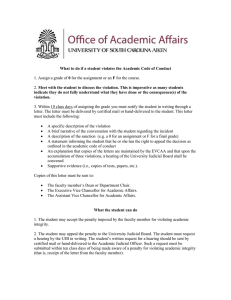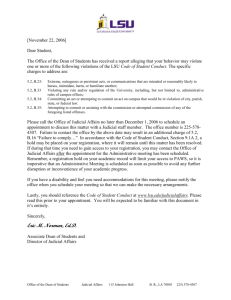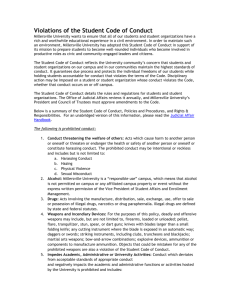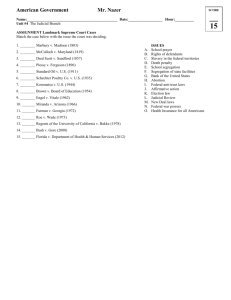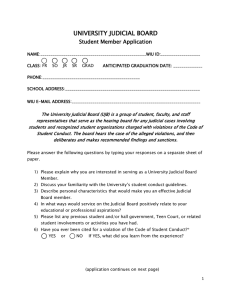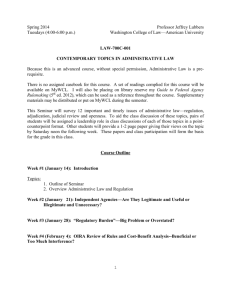OFFICE OF JUDICIAL AFFAIRS ASSESSMENT NARRATIVE 2004-05
advertisement
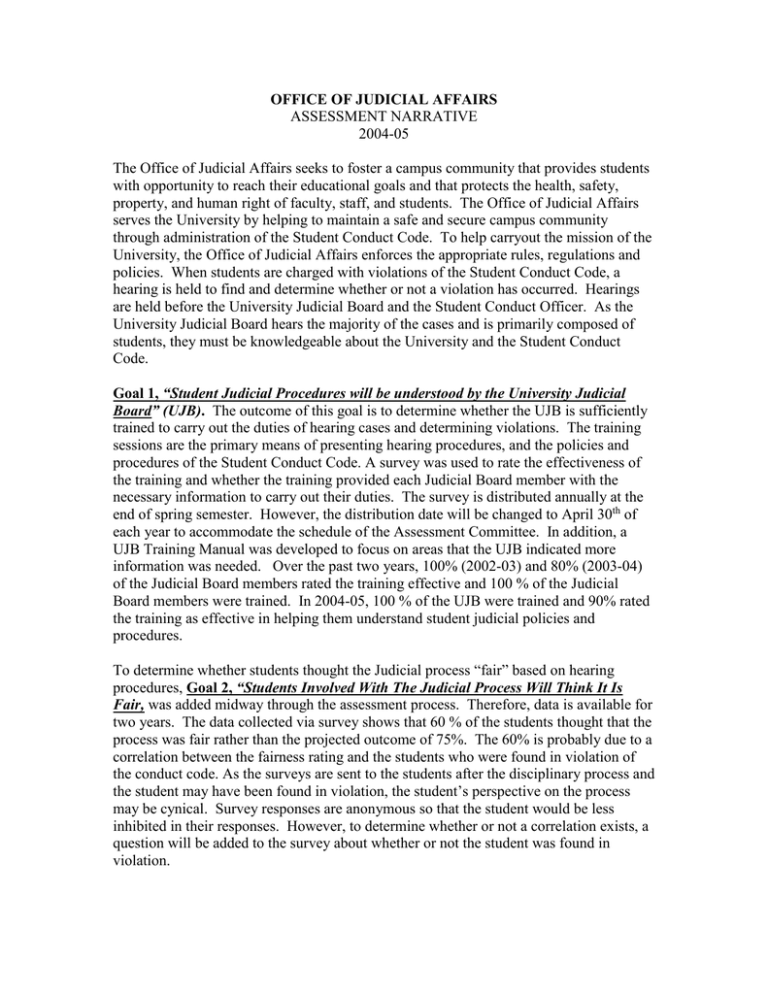
OFFICE OF JUDICIAL AFFAIRS ASSESSMENT NARRATIVE 2004-05 The Office of Judicial Affairs seeks to foster a campus community that provides students with opportunity to reach their educational goals and that protects the health, safety, property, and human right of faculty, staff, and students. The Office of Judicial Affairs serves the University by helping to maintain a safe and secure campus community through administration of the Student Conduct Code. To help carryout the mission of the University, the Office of Judicial Affairs enforces the appropriate rules, regulations and policies. When students are charged with violations of the Student Conduct Code, a hearing is held to find and determine whether or not a violation has occurred. Hearings are held before the University Judicial Board and the Student Conduct Officer. As the University Judicial Board hears the majority of the cases and is primarily composed of students, they must be knowledgeable about the University and the Student Conduct Code. Goal 1, “Student Judicial Procedures will be understood by the University Judicial Board” (UJB). The outcome of this goal is to determine whether the UJB is sufficiently trained to carry out the duties of hearing cases and determining violations. The training sessions are the primary means of presenting hearing procedures, and the policies and procedures of the Student Conduct Code. A survey was used to rate the effectiveness of the training and whether the training provided each Judicial Board member with the necessary information to carry out their duties. The survey is distributed annually at the end of spring semester. However, the distribution date will be changed to April 30th of each year to accommodate the schedule of the Assessment Committee. In addition, a UJB Training Manual was developed to focus on areas that the UJB indicated more information was needed. Over the past two years, 100% (2002-03) and 80% (2003-04) of the Judicial Board members rated the training effective and 100 % of the Judicial Board members were trained. In 2004-05, 100 % of the UJB were trained and 90% rated the training as effective in helping them understand student judicial policies and procedures. To determine whether students thought the Judicial process “fair” based on hearing procedures, Goal 2, “Students Involved With The Judicial Process Will Think It Is Fair, was added midway through the assessment process. Therefore, data is available for two years. The data collected via survey shows that 60 % of the students thought that the process was fair rather than the projected outcome of 75%. The 60% is probably due to a correlation between the fairness rating and the students who were found in violation of the conduct code. As the surveys are sent to the students after the disciplinary process and the student may have been found in violation, the student’s perspective on the process may be cynical. Survey responses are anonymous so that the student would be less inhibited in their responses. However, to determine whether or not a correlation exists, a question will be added to the survey about whether or not the student was found in violation. In 2004-05:100 % of the students who returned the survey rated the process as fair and the research conducted shows no correlation between the violation and fairness. During 2004-05, more students selected to have their case heard before the Judicial Affairs Officer, meaning that they acknowledged that they violated the code as charged. During the session with the Judicial Affairs Officer where the student accepts responsibility for the charges, they have an opportunity to discuss the possible sanctions with the JAO and agree to accept them. This seems to have had an impact on the 40% improvement rate over the past year. Goal 3: Students Found in Violation of CSU Drug and Alcohol Policy Will Understand Institutional Policies is concerned with making sure students complete the sanctions imposed when they are found in violation of the drug and alcohol policy. All students who are found in violation of a drug or alcohol violation (after all appeals are exhausted) must attend a drug and/or alcohol education session and complete a project. Outcome measures have been met for all three years. Those alcohol and drug violations that were reported late spring semester/2004 are included in the data for 2004-05. Data related to this outcome will always be included in the next year’s report because students who are found in violation have 10 days to appeal the decision. During the appeal phase, sanctions (educations sessions) are not enforced. Those students who did not complete their sanctions had hearings late during spring semester and in some cases after the semester was over. This is a due process matter. The Office of Judicial Affairs has no control over when violations occur or when they will be reported. However, as there several unresolved cases for 2004-05, these cases will be reported in 2005-06. In addition, as the Wellness Coordinator position has been moved to Health and Wellness Services, the emphasis for the Office of Judicial Affairs has been changed to focus on sanctions rather than wellness. Students who are found in violation write a paper about drugs and/or alcohol either on the “dangers of underage drinking” or the legal penalties associated with drug use. This enables students to have an active role in learning and understanding instititutional policies related to drug and alcohol use. It is also less expensive that the on-line alcohol sessions. The Office of Judicial Affairs is committed to providing students with the highest quality services and ensuring that the juridical disciplinary process is fair, objective, and resolves conflict. These goals focus on the basic principles of the office, which is the health, safety, and human right of the campus community.
